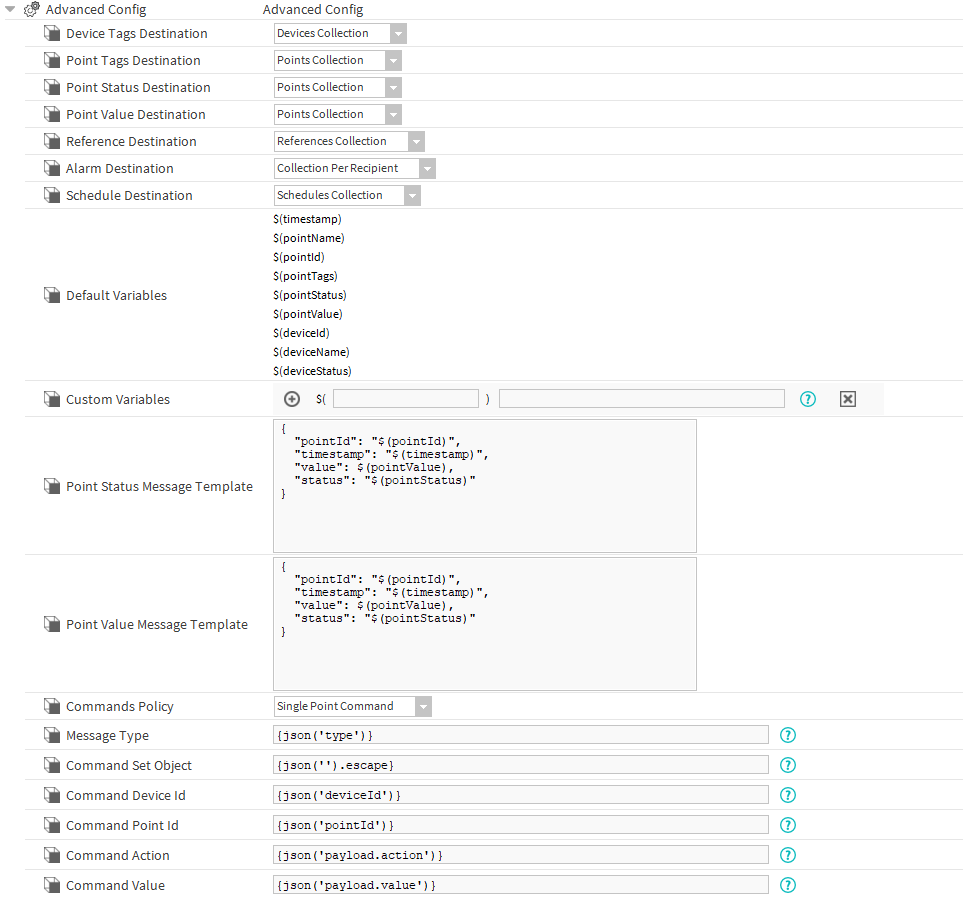Description
The RealTimeConnector is the responsible for managing the connection to the remote service.
It is also possible to configure the way top send and receives messages to your Database.
Implementation
- Drag and drop the RealTimeConnector from the palette (btibAWS, btibIotHub, etc) to to Services > Btib Service > External Connectors > Realtime Connectors.
- Fill the adequate fields.
- Enable the connector. It is also possible to ping the Connector to check if it works.
Properties
- Status : Connection status.
- Fault Cause : The error message status.
- Enabled : Enable/Disable the component.
- Last Attempt : Datetime of the last connection attempt.
- Last Success : Datetime of the last successful attempt.
- Last Failure : Datetime of the last failed attempt.
- Auto Provision: Create and manage devices automatically.
- Use Data Retention : Enable data retention for this connector.
- Data Retention Duration : The duration of the Data Retention.
- Data Send Retry Duration : The amount of time to wait before retrying to send data.
- Messages Thread Pool Size : The number of thread workers for message sending increment this to increment messages throughput.
Advanced Config
- DeviceTagsDestination: The destination where device tags will be sent during the initialization.
- PointTagsDestination: The destination where point tags will be sent during the initialization.
- PointStatusDestination: The destination where the point status message will be sent.
- PointValueDestination: The destination where the point value message will be sent.
- ReferenceDestination: The destination where the reference message will be sent.
- AlarmDestination: The destination where the alarm messages will be sent via the alarm recipient associated to this connector.
- ScheduleDestination: The destination where the schedule messages will be sent.
- DefaultVariables: The default variables to be used by the messages template.
- CustomVariables: Set of user defined variables to be used by the messages template.
- PointStatusMessage Template: The status message template used to construct the message to be sent by the connector.
- PointValueMessage Template: The value message template used to construct the message to be sent by the connector.
- CommandsPolicy: The commands policy either single or multi message.
- MessageType: The type of the message (Default: POINT_ACTION).
- CommandSetObject: The json format that contains the commands if the command policy is multi message.
- CommandDeviceId: The sformat path to extract the device id from the external message.
- CommandPointId: The sformat path to extract the point id from the external message.
- CommandAction: The sformat path to extract the command action from the external message.
- CommandValue: The sformat path to extract the value from the external message.
- CommandDuration: The sformat path to extract the command duration in seconds from the external message.
- StartDate: Start timestamp of the history (Optional).
- EndDate: The end date for the history (Optional).
- Delta: Apply a delta for the history (Default: false).
- RollUp: Apply a rollup for the history (Optional).
- HistoryMessageVariable: Set of predefined variables to use in the history message template.
- HistoryMessageTemplate: The template message to use for the history message.
- AlarmUUID: The sformat path to extract the uuid.
- CommandScheduleId: The sformat path to extract the schedule id from the external message.
- Weekday: The sformat path to extract the weekday from the external message.
- StartTime: The sformat path to extract the startTime from the external message.
- EndTime: The sformat path to extract the endTime from the external message.
- InvalidValuePolicy: What to do when an invalid value detected.
- InvalidStatusPolicy: Determines which out values will be filtered. Any point with a Status matching any Status in this slot won't be sent to the database.
- JsonMessagePolicy: The policy to use for value that contains json text.
Actions
- Ping : Ping the DataBase.
Fault Causes
- Unable to connect : Check your connection data, correct them if needed and ping the Connector again


